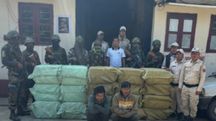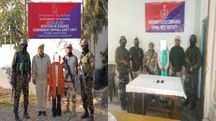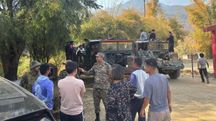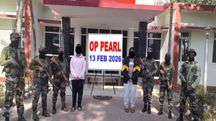
How Meira Paibis, Manipur’s women vigilante groups, have made Indian army ‘helpless’
Meira Paibi, women vigilante groups that function as conscience keepers of Meitei society, has a long history of conflict with the Indian Army and Assam Rifles. In the 1980s, they used to hold night vigils with flaming torches and stood guard against the armed forces taking away the boys on suspicion of insurgent activities.
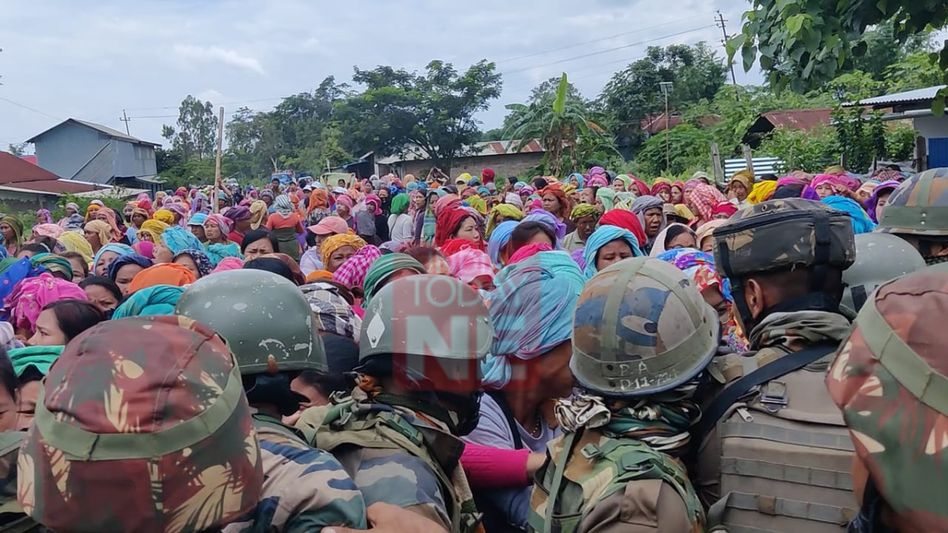 How Meira Paibis, Manipur’s women vigilante groups, have made Indian army ‘helpless’
How Meira Paibis, Manipur’s women vigilante groups, have made Indian army ‘helpless’On June 24, the Indian Army’s Dimapur-based 3 Corps, known as Spear Corps, released a video saying that some 1,200 women blocked their convoy in Itham village of Manipur’s Imphal East district and forced them to release a dozen hardcore militants of Kanglei Yawol Kanna Lup (KYKL), a banned militant group which was behind the 2015 ambush of a convoy of the Army’s Dogra Regiment in Manipur, killing 20 soldiers. One of the 12 militants, self-styled Lt Col Moirangthem Tamba alias Uttam, was the mastermind of the ambush. The army said that the convoy released the militants because it did not want to risk the lives of civilians and decided to end the standoff, which lasted for nearly a day.
𝗢𝗽𝗲𝗿𝗮𝘁𝗶𝗼𝗻𝘀 𝗶𝗻 𝗜𝘁𝗵𝗮𝗺 𝗩𝗶𝗹𝗹𝗮𝗴𝗲 𝗶𝗻 𝗜𝗺𝗽𝗵𝗮𝗹 𝗘𝗮𝘀𝘁 𝗗𝗶𝘀𝘁𝗿𝗶𝗰𝘁
— SpearCorps.IndianArmy (@Spearcorps) June 24, 2023
Acting on specific intelligence, operation was launched in Village Itham (06 km East of Andro) in Imphal East by Security Forces today morning. Specific search after laying cordon was… pic.twitter.com/7ZH9Jp8nOI
Two days later, Spear Corps posted another tweet, with embedded videos showing how women groups in Manipur were “deliberately interfering” in their operations. “Women activists in Manipur are deliberately blocking routes and interfering in Operations of Security Forces. Such unwarranted interference is detrimental to the timely response by Security Forces during critical situations to save lives and property,” read the tweet.
The embedded video titled “Demystifying myth of peaceful blockade led by women in Manipur” shows large group of women surrounding an army convoy in Itham on June 24. The women were allegedly “helping rioters flee” in this incident. The video also claims that entry and exit routes to Assam Rifles base was dug up to cause delay in their movements. The helplessness of the armed forces was evident as through the tweet, Indian Army appealed to the people of Manipur to help them to restore peace in the state, engulfed in ethnic clashes since May 3.
Women activists in #Manipur are deliberately blocking routes and interfering in Operations of Security Forces. Such unwarranted interference is detrimental to the timely response by Security Forces during critical situations to save lives and property.
— SpearCorps.IndianArmy (@Spearcorps) June 26, 2023
🔴 Indian Army appeals to… pic.twitter.com/Md9nw6h7Fx
This serious allegation and appeal by the Indian Army has once against brought to the fore the role of women activist groups in Manipur, commonly known as Meira Paibi. Several senior officers have been claiming, from the beginning of the violence, that these groups block roads, restricting the movements of armed forces and helping miscreants destroy targeted villages. On many occasions the soldiers were forced to walk on foot, leaving enough time for miscreants to flee the spots. This modus operandi has posed serious difficulties for the armed forces in handling the law and order situation in Manipur. Not just movements of security forces, supplies of essential items and food have also been hit in several areas because of blockades of both the National Highway and other roads by women vigilante groups and some tribal groups too.
Ethnic clashes between the Meiteis and Kukis have continued for more than a month since it first erupted on May 3. The Indian Army and Assam Rifles, which are there to assist the civil administration in Manipur in tackling the situation, claim that it’s next to impossible for them to handle these civilian women. As they are trained in combat tactics which is aimed at neutralising—read killing—enemy soldiers, the soldiers often have no answer to unarmed civilian women, who are their own citizens. Besides, the Indian Army and Assam Rifles are extremely cautious in dealing with women in the backdrop of a contentious past.
On July 11, 2004, the bullet-ridden and badly mutilated body of Thangjam Manorama, 32-year-old woman from Manipur, was found abandoned after she had been arrested by security forces. It was alleged that she had been tortured and raped by soldiers of Assam Rifles. Five days later, around 30 middle-aged women stood naked in front of the Assam Rifles office showing placards that read: “Indian Army, rape us too”.
A Bimol Akoijam, an associate professor at Jawaharlal Nehru University believes that the recent actions of the Meira Paibis blocking the movement of armed forces is the result of a huge trust deficit between the Meiteis and the armed forces.
“There were issues with Assam Rifles earlier as well. To win back the Meitei people's trust, the government and the armed forces must do something concrete to clear the impression that Assam Rifles and Kuki militant groups are hand-in-gloves. The Army must protect its image that it stands by every Indian citizen,” says Akoijam.

The Meira Paibis, or “Women with Torches”, are Meitei women who are not formally organised and have no political leaning. They become active only when the state or society faces any crisis. They yield considerable moral and social influence among the Meiteis.
According to Binalakshmi Nepram, author and Manipuri activist, the Meira Paibis have been active for decades and have taken active role in protesting against the contentious Armed Forces Special Powers Act (AFSPA).
Though the current avatar of Meira Paibis can be traced to 1977, women activism in Manipur has a long history. In 1904, thousands of women came out in protest when British administration forced men between the ages of 17 and 60 to provide free labour for a specified number of days each month. The British had to eventually withdraw the practice. In 1939, Manipuri women stood up against a rise in prices of food items such as rice. This movement was known as Nupi Lan.
In 1977, women from across all sections of society in Manipur joined hands against growing alcoholism and drug abuse in the state. In 1980, a large group of women marched to a police station and forced the administration to release a man who had been detained on suspicion of insurgency. Soon, women across the state, began to hold night vigils with flaming torches and stood guard against the armed forces arresting or detaining the boys on charges of involvement in militancy. Gradually, Meira Paibis expanded their focus areas—from human rights violations by armed forces to demands for the Inner Line Permit (ILP)—and began to work as the society’s most influential vigilante group.
Major activities of Meira Paibis since May 3
June 13: Blockade at Nunshung; the army alleges it helped miscreants set on fire 7-8 villages in Khamanlok
June 18: Meira Paibis-led women groups boycotted Prime Minister Modi’s monthly radio program “Maan Ki Baat” at different locations; smashed transistor sets in the Singjamei area of Imphal and in the Kakching market
#Manipur: #Protesters refuse to listen to #PMModi saying, "No to Mann Ki Baat, Yes to Manipur ki Baat"https://t.co/Ww2oAGZW9v pic.twitter.com/6mZiuyaU2G
— India Today NE (@IndiaTodayNE) June 18, 2023
June 20: The Assam Rifles arrested four suspected United National Liberation Front (UNLF) cadres on the night of June 19. The next day, the Meira Paibis staged a protest at Lilong police station where the UNLF cadres were lodged. Released on bail happened at 9 am.
June 24: Around 2,000 Meira Paibis women assembled in Kanglatombi and blocked NH-2 from 11:30 am to 7 pm. They brought an excavator to dig a hole in the road leading from NH-2 to Assam Rifles operating base in Hathikhowa, restricting movements of soldiers.
June 24: More than 1,200 Meira Paibis women blocked a convoy of Indian Army and forced them to release 12 members of the banned extremist group Kanglei Yawol Kanna Lup (KYKL).
Unedited UAV Footage@adgpi @easterncomd #Manipur pic.twitter.com/mfVWK0CHKt
— SpearCorps.IndianArmy (@Spearcorps) June 24, 2023
Copyright©2026 Living Media India Limited. For reprint rights: Syndications Today

